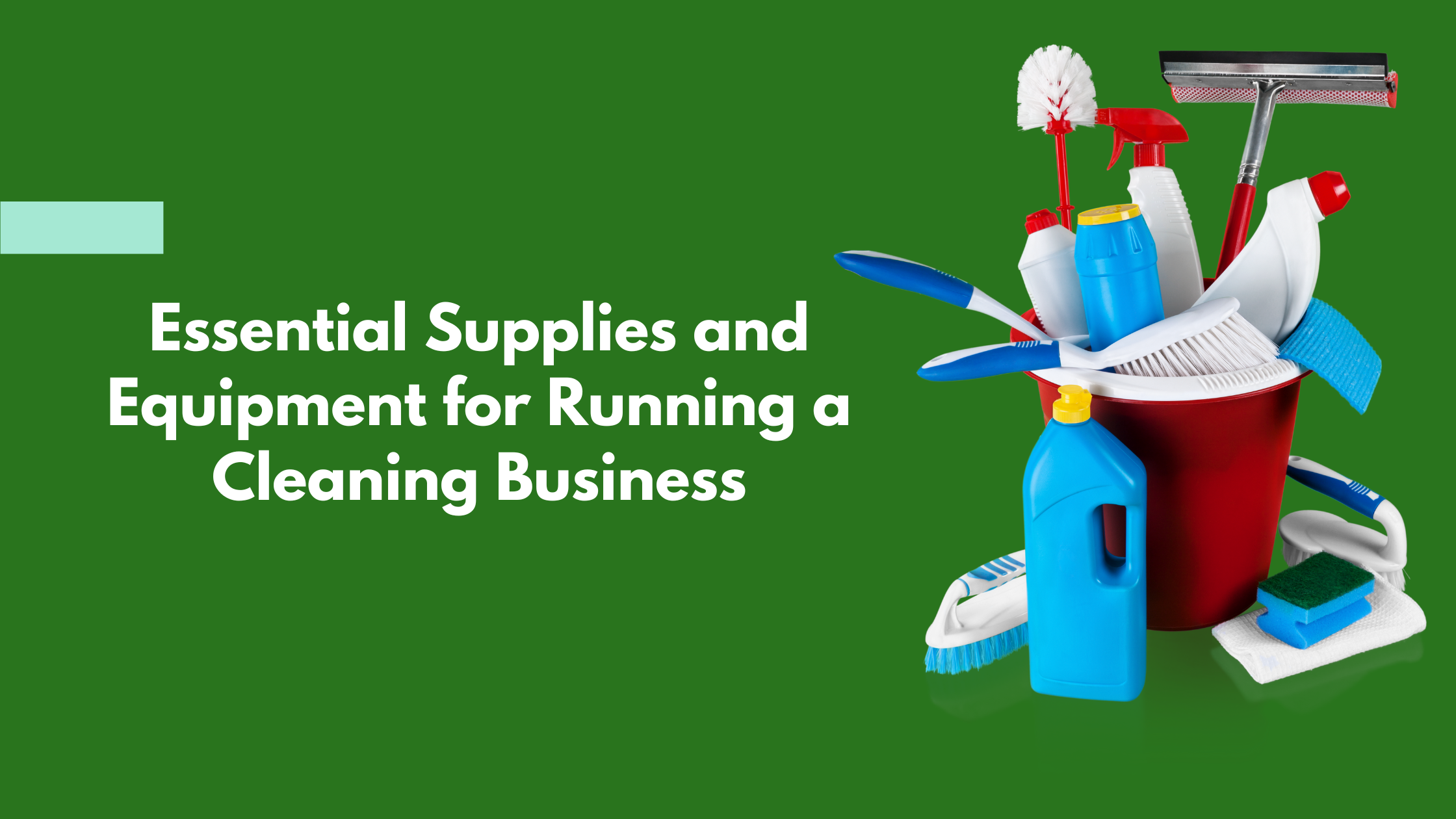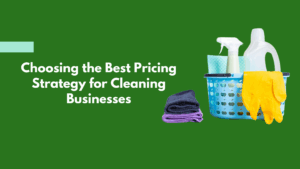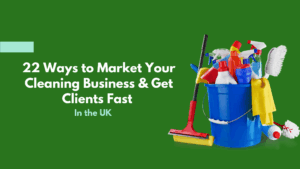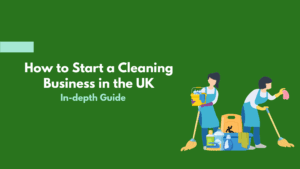To start a cleaning business, you need more than a mop and a bucket. You need efficiency, professionalism, and good results. To achieve all of these, the right supplies and equipment have to be in place.
Think about it: if you walk into a home or office and see a cleaning crew with outdated, ineffective tools, would you feel confident in their work? Probably not. Customers expect spotless results, and to meet that standard, you need the right tools for the job.
In this guide, we are going to break down exactly what you need, from must-have basics to specialized equipment depending on the type of cleaning service you offer. Whether you’re just starting or looking to upgrade, you’ll get a clear, no-nonsense roadmap to building a professional cleaning business that stands out. Keep reading to know more about all the supplies and equipment for running a cleaning business.
Table of Contents
The Type of Cleaning Business You Run Will Determine Your Unique Equipment Needs
Before you start buying equipment, you need to be clear on the type of cleaning business you’re running. Not all cleaning services require the same tools, and investing in the wrong equipment can be a costly mistake.
To get the best results, you need the right tools for the right job. Below are the main types of cleaning businesses and the equipment each one typically requires.
Residential Cleaning
Residential cleaning is one of the most common and accessible cleaning services. Homeowners expect a thorough clean that includes dusting, vacuuming, mopping, bathroom sanitation, and kitchen cleaning.
Because this type of cleaning involves private homes, the tools you use should be compact, efficient, and easy to transport.
At the very least, you’ll need high-quality vacuum cleaners, microfibre cloths, disinfectants, and a good mop system.
Many professional residential cleaners opt for HEPA-filter vacuums, which remove 99.97% of dust, pollen, and allergens, making them ideal for households with pets or allergy sufferers.
Using cheap or ineffective equipment in this sector is risky as it can slow down your work, cause frustration, and lead to poor customer reviews.
Commercial Cleaning
Commercial cleaning requires more robust equipment than residential cleaning. Businesses expect deep cleaning and maintenance of high-traffic areas, which means your tools must be powerful enough to handle larger spaces and heavier dirt build-up.
A standard commercial cleaning setup includes industrial-grade vacuum cleaners, floor scrubbers, and high-powered disinfectants. Auto-scrubbers are particularly useful in this sector, as they clean and dry large floor areas much faster than manual mopping, reducing slip hazards.
Slips and trips are responsible for over 30% of workplace injuries, according to iHasco, so using the right cleaning tools can actually help businesses comply with health and safety regulations.
Additionally, businesses often require out-of-hours cleaning, which means efficiency is key. Backpack vacuums are a game-changer here as they allow cleaners to move quickly and cover large areas without dragging a bulky machine around.
Carpet and Upholstery Cleaning
Carpet cleaning is a specialised niche that requires dedicated equipment. Unlike general cleaning services, which focus on surface-level dirt, carpet cleaning involves extracting deeply embedded grime, bacteria, and allergens.
A basic vacuum cleaner won’t cut it here. You need a carpet extractor, which uses a combination of water, cleaning solutions, and suction to remove dirt from deep within carpet fibres.
Steam cleaners are another essential tool, especially for upholstery and delicate fabrics. Many professional carpet cleaners also use rotary machines, which agitate carpet fibres for a deeper clean.
Statistics show that carpets can hold up to four times their weight in dirt, and many homeowners and businesses are unaware of how much bacteria and allergens they’re harbouring.
If you’re in this business, having the right equipment not only improves your results but also helps you educate clients on the importance of deep cleaning.
Window Cleaning
Window cleaning requires specialist equipment, especially for high-rise buildings, and using the wrong tools here isn’t just inefficient, it can be dangerous.
For residential and low-rise buildings, a telescopic pole system with a squeegee and microfiber pad is essential.
However, for high-rise window cleaning, professionals use water-fed pole systems that deliver purified water through extendable poles, eliminating the need for ladders in many cases.
Purified water is also important because it dries streak-free, leaving no mineral deposits behind, which is a major selling point for clients.
Safety is another critical concern in this sector. According to UK Health and Safety Executive (HSE) reports, falls from height account for around 25% of all fatal workplace accidents.
So if you’re running a window cleaning business, investing in safe, high-quality equipment isn’t optional, it’s a legal and ethical necessity.
Post-Construction Cleaning
Post-construction cleaning is one of the most demanding types of cleaning services. It involves clearing out dust, debris, adhesives, paint splatters, and other stubborn residues left behind after building or renovation work.
As a result, standard cleaning tools won’t be enough and you need industrial-grade equipment.
One of the most important pieces of equipment here is a high-powered industrial vacuum cleaner with a HEPA filter.
Construction dust is extremely fine and can linger in the air, causing respiratory issues if not properly cleaned.
A regular household vacuum isn’t designed for this level of dust extraction and can easily become clogged or damaged.
Pressure washers are another must-have tool for post-construction cleaning, as they quickly remove cement dust and paint stains from exterior surfaces.
Consequently, heavy-duty scrubbers and degreasers are essential for removing adhesives and stubborn grime from floors and walls.
Builders and property developers expect fast turnaround times for post-construction cleaning, as delays can hold up property handovers. So using the right equipment allows you to work efficiently without compromising on quality, making your business more competitive in this high-demand sector.
Must-Have Equipment and Supplies for Every Cleaning Business
No matter what type of cleaning service you offer, there are certain tools and supplies that are absolutely essential.
Without them, you’ll struggle to deliver quality results, work efficiently, and maintain a professional image. These include:
Basic Cleaning Tools
Every cleaning job, whether it’s a small flat or a large commercial space, requires a set of fundamental tools.
Microfibre cloths, for example, are non-negotiable. They are far superior to standard clothes because they trap dust and dirt rather than just pushing it around.
Infact, studies have shown that microfibre materials remove up to 98.9% of bacteria using just water, making them both effective and environmentally friendly.
A high-quality mop system is another essential. Traditional string mops leave too much water behind, increasing the risk of slips and falls. Flat mops with reusable microfiber pads are a better option as they absorb liquid efficiently and can be easily washed and reused.
Many professional cleaners also opt for spray mops, which allow for quicker and more precise cleaning without the need to carry a heavy bucket.
In addition, a sturdy, well-designed vacuum cleaner is crucial for any cleaning business, whether for residential or commercial cleaning.
Vacuum Cleaners for Floor Care
A vacuum cleaner is one of the most frequently used tools in any cleaning business, so choosing the right one makes a huge difference in efficiency and results.
If you’re cleaning both carpets and hard floors, a vacuum with an adjustable head is ideal. For businesses dealing with large spaces, backpack vacuums offer greater mobility and speed, reducing strain on the user.
However, for deeper carpet cleaning, you’ll need a carpet extractor. This machine injects cleaning solution into carpet fibres and then extracts the dirt and moisture, leaving carpets refreshed and sanitised.
Regular vacuuming only removes surface dirt, while a carpet extractor eliminates the bacteria, allergens, and grime trapped in the fibres. Given that carpets can have so much dirt, offering deep cleaning as part of your services can be a great upsell for clients.
For hard floors, a commercial-grade floor scrubber is a worthwhile investment. These machines scrub, rinse, and dry floors in one pass, cutting cleaning time dramatically.
Manual mopping can take twice as long and often leaves streaks or residue that can result in slip-and-fall accidents, but a scrubber dries the surface immediately helps businesses meet safety regulations.
Cleaning Agents and Disinfectants
Using the right cleaning agents is essential for tackling different types of dirt, stains, and bacteria.
A good all-purpose cleaner is the basic item of most cleaning kits, but you’ll also need more specialised products.
Degreasers, for instance, are crucial for kitchens and food preparation areas, where built-up grease can be difficult to remove.
Descalers are also necessary for bathrooms and areas with hard water build-up, especially in the UK where over 60% of the country has hard water, leading to frequent limescale problems.
Disinfectants are even more particularly important, with businesses and homeowners more aware than ever of hygiene standards. Look for professional-grade disinfectants that meet BS EN 14476 standards, which ensure they are effective against viruses and bacteria.
Some clients prefer eco-friendly alternatives, so having a selection of biodegradable and chemical-free cleaning products can help you appeal to environmentally conscious customers.
Protective Gear for Keeping Yourself and Your Team Safe
Cleaning often involves handling chemicals, dust, and bacteria, so proper protective gear is a must.
The most basic protective gear are hand gloves, which are essential for preventing skin irritation and chemical exposure. Disposable gloves work well for one-off jobs, while reusable rubber gloves offer better durability for regular cleaning.
Also, face masks are becoming more common in professional cleaning, especially for tasks that involve dust or strong chemicals. If you’re working in environments with heavy dust or airborne particles, such as post-construction cleaning, an FFP2 or FFP3-rated mask provides the best protection.
Shoe covers are another often-overlooked item that can make a big difference, especially in residential cleaning. They prevent dirt from being tracked into a client’s home and show attention to detail and professionalism.
Additionally, uniforms and aprons not only protect clothing but also reinforce your brand identity. A professional appearance reassures clients that they’ve hired a reputable service.
As a result, investing in branded uniforms can help with marketing, as clients will remember your company name and associate it with professionalism.
Storage and Transport for Keeping Equipment Organised and Accessible
A well-organised cleaner is a more efficient cleaner. Lugging around a cluttered kit slows you down and makes you look unprofessional. That’s why a sturdy cleaning caddy or trolley is essential for keeping supplies organised and within reach.
For larger jobs, especially in commercial or industrial cleaning, you’ll need a mobile cleaning cart with compartments for cleaning agents, tools, and waste disposal. This improves efficiency and reduces strain by allowing you to move everything in one trip rather than carrying multiple items back and forth.
If you run a mobile cleaning service, having a properly equipped vehicle is just as important as the tools themselves. A van with organised shelving for storing equipment and supplies can save time and prevent damage to expensive tools.
Why Investing in Quality Equipment Pays Off
Trying to cut costs by using low-quality equipment is a false economy. Cheaper vacuum cleaners, for instance, break down more often, poor-quality cloths leave streaks and residue, and ineffective cleaning products lead to more time spent scrubbing.
Investing in professional-grade tools improves efficiency, produces better results, and helps build a reputation for reliability. Over time, this adds up to more clients served, higher earnings, and a stronger business.
In fact, businesses that invest in high-quality cleaning tools see a 30% increase in operational efficiency, and a higher customer retention rate because clients trust a professional setup, according to Global Industries.
This is because clients notice the difference, and when they see a well-equipped, professional cleaning team, they’re more likely to recommend your services to others. Having the right tools sets your business up for long-term success.
Proper Maintenance and Storage of Cleaning Equipment
Investing in high-quality cleaning equipment is only half the battle. If you want your tools to last, perform efficiently, and deliver professional results, proper maintenance and storage are non-negotiable.
Cleaning equipment undergoes heavy daily use, especially in commercial settings.
Over time, dirt, dust, and moisture can build up, leading to wear and tear. Without proper maintenance, your equipment will lose efficiency, break down more frequently, and end up costing you more in repairs and replacements.
Beyond longevity, well-maintained equipment also ensures better cleaning results. A vacuum with a clogged filter, for example, won’t provide strong suction, leaving dirt behind. A floor scrubber with a worn-out pad won’t clean properly, resulting in streaks and residue.
When your equipment functions at its best, you can deliver consistent, high-quality service that keeps clients satisfied.
How to Maintain Different Types of Cleaning Equipment
Vacuum Cleaners
A vacuum cleaner is one of the most frequently used tools in any cleaning business. If you don’t maintain it properly, suction power will drop, and the motor may overheat, leading to costly repairs.
Start by emptying the dustbin or replacing the bag regularly. A full bag or bin reduces suction and puts strain on the motor. It’s best to empty it when it’s about two-thirds full, rather than waiting until it’s completely packed.
Consequently, filters play a crucial role in trapping dust and allergens. A clogged filter reduces efficiency and releases dust back into the air, lowering indoor air quality. If your vacuum has a HEPA filter, clean or replace it according to the manufacturer’s instructions, usually every six to twelve months, depending on usage.
The vacuum brush roll and hose should also be checked frequently. Hair, string, and debris can wrap around the brush roll, making it less effective. A simple clean with scissors or a small knife can remove tangled fibres.
Likewise, blockages in the hose can lead to poor suction, so inspect it regularly to ensure there’s no obstruction.
Floor Scrubbers and Polishers
Commercial floor scrubbers and polishers are expensive investments, and keeping them in good condition is vital for getting the best return on your money.
After each use, clean the water tanks thoroughly. Dirty water left sitting inside can lead to bacterial growth and unpleasant odours. It can also clog the machine, reducing efficiency. Many models have removable tanks, making it easy to rinse and dry them after every job.
Next, check the scrubbing pads and brushes regularly. Over time, they wear down and lose effectiveness. Using a worn-out pad means you’ll have to go over the same area multiple times, which wastes time and effort. Depending on the frequency of use, scrubbing pads typically need replacing every three to six months.
Battery-operated floor scrubbers require special attention. You’ll need to always charge the battery fully after use and store the machine in a cool, dry place. If left uncharged for long periods, the battery life can decrease significantly.
Carpet and Upholstery Cleaners
Carpet extractors and upholstery cleaners handle deep cleaning jobs, meaning they deal with a lot of dirt, moisture, and cleaning solutions. So proper maintenance is key to preventing mould growth and keeping them running efficiently.
The water and solution tanks should be emptied and rinsed after each use. Leaving dirty water in the tank can lead to bacteria and foul smells. If your machine has a removable nozzle, take it apart and wash it thoroughly to remove any residue.
Filters and suction components should also be checked regularly. A clogged filter reduces performance, while blocked suction nozzles can make drying times longer, leaving carpets damp and prone to mould growth.
A well-maintained carpet cleaner ensures a faster drying time and better results, making your service stand out.
Steam Cleaners
Steam cleaners are fantastic for sanitising surfaces without chemicals, but they require proper care to function effectively. Since they use water, limescale build-up can be a major issue, especially in areas with hard water.
Descale your steam cleaner regularly using a manufacturer-approved descaling solution or a vinegar-water mix. This prevents mineral deposits from clogging the heating element, ensuring the machine continues to produce high-temperature steam efficiently.
Always empty the water tank after each use to prevent bacterial growth. If your machine has detachable nozzles and brushes, rinse them thoroughly to remove dirt and residue.
Microfibre Cloths and Mops
Microfibre cloths and mops are cost-effective and highly effective at trapping dirt and bacteria, but they must be cleaned properly to maintain their efficiency.
You need to avoid using fabric softeners when washing microfiber cloths. Softener coats the fibres, making them less absorbent and less effective at picking up dirt.
Instead, wash them in warm water with a mild detergent and let them air dry.
Then separate them from lint-producing fabrics like cotton towels to prevent fibres from sticking to them.
A well-maintained microfibre cloth can last for over 500 washes, making it a smart investment for any cleaning business.
Properly Store Cleaning Equipment
Good storage practices not only protect your equipment but also keep your workspace organised and professional-looking.
Store vacuums, floor scrubbers, and other large machines in a dry, cool place to prevent moisture damage. If possible, keep them off the ground using shelving or raised platforms to avoid contact with damp floors.
Hang mops and brooms rather than leaving them standing in a bucket or against a wall. Storing them upright allows them to dry properly, preventing mould and bad odours.
Cleaning chemicals should unfailingly be stored in a well-ventilated area, away from direct sunlight and extreme temperatures.
Always keep them in their original containers with labels intact to avoid mix-ups as mixing the wrong chemicals can be dangerous and even produce toxic fumes.
Specialist Cleaning Products for Different Industries
Every industry has its own cleaning challenges, and having the right specialist products can give your business an edge.
For healthcare settings, hospital-grade disinfectants that are effective against MRSA and C. difficile are required. Many hospitals also prefer alcohol-based sanitisers, as they provide quick and effective germ-killing action.
For schools and nurseries, child-safe cleaning products with non-toxic, low-allergen formulas are recommended to protect young children from harmful chemicals. This is where you’ll most likely need to use eco-friendly products for cleaning.
When it comes to hospitality businesses, odour eliminators and air fresheners are key to maintaining a fresh and inviting atmosphere. Many hotels and restaurants also use fabric fresheners to keep upholstery, curtains, and carpets smelling pleasant between deep cleans.
Why Are Eco-Friendly and Sustainable Cleaning Products Important?
Sustainability is becoming increasingly important in the cleaning industry. Many businesses and clients are moving away from harsh chemicals in favour of eco-friendly alternatives.
The UK government has been pushing for greener cleaning solutions, with many companies now required to meet environmental targets.
Eco-friendly cleaning products reduce chemical pollution, are safer for staff and clients, and often come in concentrated forms to cut down on plastic waste. Certifications such as EU Ecolabel or Cruelty-Free International are good indicators of genuinely sustainable products.
Additionally, switching to refillable bottles and biodegradable packaging is another great way to make your cleaning business more environmentally friendly while also saving on costs in the long run.
A Good Website: The Most Essential Tool for a Successful Cleaning Business
Having a professional website is just as essential as having the right cleaning equipment. Your website is the first place potential clients check when they need cleaning services. Without a well-designed website, you’re missing out on valuable leads and revenue. This is why a good website is one of the first things to consider when starting a cleaning business.
Think about it: when someone needs a cleaner, where do they go first? Most people head straight to Google. Studies show that 76% of people who search for a service nearby visit a business within 24 hours, and a well-optimised website ensures they find and choose you over your competitors.
Here’s what a strong cleaning business website should do:
Make a Strong First Impression
You only have a few seconds to grab a visitor’s attention.
A clean, modern, and easy-to-navigate website instantly tells potential customers that you’re professional and reliable.
If your site looks outdated or takes too long to load, visitors will leave and call someone else.
Showcase Your Services Clearly
Your cleaning services website design should clearly list your services, whether it’s residential cleaning, office cleaning, deep cleaning, or specialist services.
Each service page should explain what you offer, the benefits, and why customers should choose you.
Prove Your Credibility with Reviews and Testimonials
Most people won’t hire a cleaner without checking reviews. In fact, 88% of consumers trust online reviews as much as personal recommendations.
So your website should highlight positive customer feedback and case studies that prove your expertise.
Allow Customers to Book Easily
People want convenience. A great cleaning business website includes an easy-to-use booking system so clients can schedule appointments without making a phone call.
This saves time and increases your chances of securing new customers.
Improve Visibility on Google
If your website is properly optimised for search engines (SEO), you’ll rank higher on Google when people search for cleaning services in your area. The higher you rank, the more potential clients will find you.
But without an SEO-friendly website, your business could be invisible online, no matter how good your services are.
Need a Smart, Sales-Driven Website Designer for Your Cleaning Business?
At Texttot Digital, we specialise in designing high-converting websites that help cleaning businesses grow. We don’t just build websites, we create lead-generating machines that bring in more clients, increase bookings, and boost your revenue.
We understand the cleaning industry inside and out, and we know what works. And our websites are fast, mobile-friendly, and designed to rank well on Google, ensuring that when someone searches for cleaning services, your business comes out on top.
If you’re ready to take your cleaning business to the next level with the best website builder for cleaning business, let’s talk. Contact us today and let’s build a website that brings in the clients for you.
Conclusion
Running a successful cleaning business takes more than just skill and hard work, it requires the right equipment, quality cleaning products, and efficient systems to ensure you deliver outstanding results every time.
From industrial-grade vacuums and eco-friendly cleaning solutions to professional uniforms and smart technology, every element plays a role in making your business run smoothly and keeping customers satisfied.
But having the right tools isn’t enough if customers can’t find you. This is why you need a well-designed website, as it is just as essential as your cleaning supplies. It’s your 24/7 sales tool, helping you attract new clients, showcase your services, and grow your business. Without it, you’re leaving money on the table.
At Text Thought Digital, we specialise in building revenue-driving websites for cleaning businesses. If you want a website that does all the marketing job for you, get in touch with us today and let’s take your cleaning business to the next level.



